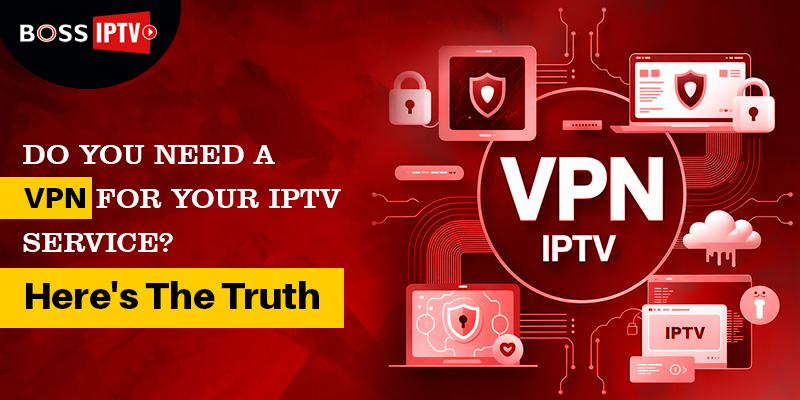
In this digital age, where content streaming has become the mainstream way of consuming entertainment, TV viewing is no exception. IPTV’s cord-cutting technology continues to empower viewers around the world to stream their favorite television content live and on-demand via the internet—anytime, anywhere, and on any device.
However, transitioning from traditional cable or satellite TV to this future-proof technology often leaves users with many unanswered queries. One of the most common is “Do you need a Virtual Private Network (VPN) to use IPTV streaming services?” Let’s dive into this blog to find out.
In simple terms, you don’t need a VPN to use IPTV services. However, using one is highly recommended, as it encrypts your connection and shields your IP address—making your IPTV streaming experience more secure, private, and unrestricted.
That said, concerns can arise depending on the type of IPTV streaming service you use. While IPTV itself is legal, not all providers are licensed or have the proper distribution rights for the content they offer. If you use a VPN not just for privacy but to access unauthorized content through an illegal IPTV provider, you may face legal consequences.
It is common for legitimate IPTV streaming services to have licensing agreements that restrict content availability based on geographical location. That’s where a VPN cracks the code!
By masking the user’s IP address and virtually changing their location by routing the connection through a server in an unrestricted region, it enables seamless IPTV streaming across borders.
Internet Service Providers (ISPs) often practice “ISP throttling,” which means they first monitor a user’s online activities, and in case they detect heavy bandwidth usage, they intentionally slow down their connection—either to manage network congestion, enforce data caps, or prioritize certain types of traffic.
However, when a user connects to a VPN, their internet traffic is encrypted, making it unreadable to their ISP. Results? No monitoring, no ISP throttling, and no buffering during streams.
In addition to engaging in ISP throttling, an internet service provider can track a user’s online activities to collect, analyze, and even sell data to third parties for targeted advertising. Furthermore, using a less reputable IPTV service may expose their real IP address to the service provider and potentially to other users.
A VPN adds that missing layer of privacy by encrypting the entire internet connection and masking the true IP address with that of the VPN server—ensuring online activities remain anonymous and personal information is protected.
This is perhaps the most sensitive aspect when discussing VPNs and IPTV together. Why? Even with precautions, many viewers end up subscribing to IPTV services that provide copyrighted content without proper licensing, exposing them to legal risks like fines and legal notices as they stream their content.
A VPN can prevent you from facing such a situation by masking your IP address and encrypting your internet traffic, making it significantly harder for third parties to trace your streaming activities back to you.
An IPTV user is exposed to significant security risks when they stream on public Wi-Fi networks such as those in cafes, airports, and hotels. Reason? These networks are often unsecured, enabling cybercriminals to intercept data, including login credentials and personal information. Here too, VPNs create a secure tunnel by encrypting connections and ultimately protecting data from snoopers.
Before choosing a VPN for your IPTV service, consider the following factors to ensure secure, private, and unrestricted IPTV streaming:
To conclude, you can definitely enjoy IPTV streaming services without a VPN, but it always leaves a room where you remain vulnerable to privacy breaches, ISP throttling, and potential legal issues—regardless of how reliable your IPTV service appears.
Therefore, it is always recommended to use a VPN to ensure seamless, secure, and truly unrestricted IPTV streams. It’s more than a digital tool, an investment in your digital privacy and entertainment freedom.
No, you don’t need a VPN to use IPTV. However, it is highly recommended to make your IPTV experience more secure, private, and unrestricted.
A VPN improves IPTV streaming by bypassing geo-restrictions, preventing ISP throttling, and offering a smoother, buffer-free viewing experience by encrypting your connection.
While a VPN can mask your IP address and encrypt your internet traffic, it does not protect you from the legal risks associated with using unlicensed IPTV content.
It is generally not safe to use IPTV streaming services on public Wi-Fi, as these networks are often unsecured. A VPN is a useful tool in this case, as it encrypts your connection and helps protect your data from hackers on public networks.
An ideal VPN for IPTV streaming is one that comes with fast speeds, a large server network, strong encryption, multi-device support, and reliable customer service.
Fill the form to get instant access!